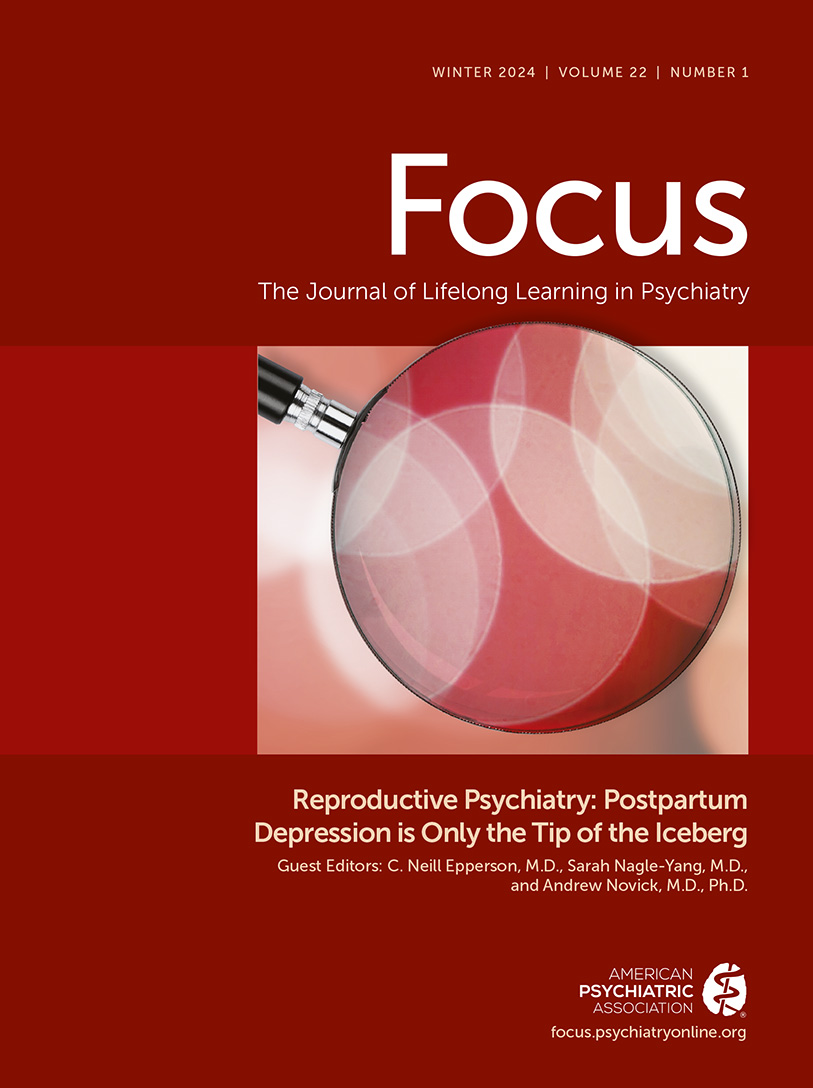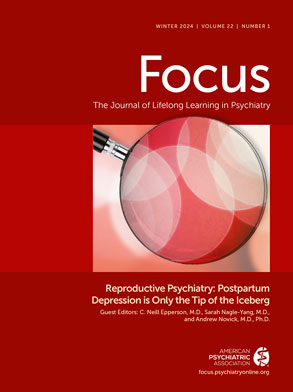Bridging the Gap: Integrating Awareness of Polycystic Ovary Syndrome Into Mental Health Practice
Abstract
Mental Health Conditions and Quality of Life
Depression
Anxiety Disorders
Bipolar Disorder
Eating Disorders
| Questionnaire | Description |
|---|---|
| Disease-specific, quality-of-life questionnaire | |
| Polycystic Ovary Syndrome Questionnaire | 26-item questionnaire that contains the following domains: Emotions (eight items), hirsutism (five items), weight (five items), infertility (four items), and menstrual disorders (four items) |
| Symptom-specific tracking questionnaires/scales | |
| Ferriman–Gallwey scale | Incorporates nine body regions (excludes legs and forearms) for the assessment of hair growth and is used to evaluate and quantify hirsutism in women |
| Menstrual symptom tracker | Numerous trackers available, can help to track menstrual cycle and ovulation; recommend the Daily Record of Severity of Problems, which allows tracking of mood and neurovegetative symptoms |
| Female Sexual Function Index | A 19-item multidimensional scale to assess female sexual function in six domains: desire, arousal, lubrication, orgasm, satisfaction, and pain |
| Rosenberg Self-Esteem Scale | A 10-item scale that assesses global self-worth by measuring both positive and negative feelings about the self |
| Globalized acne grading scale | A six-item clinical tool to assess the severity of acne vulgaris |
| Eating Disorder Examination Questionnaire | Four domains of disordered eating—restraint eating, eating concerns, shape concerns, and weight concerns—as well as behavioral symptoms |
| Depression symptom tracking | Numerous standardized scales available; the Beck Depression Inventory, the Hospital Anxiety and Depression Scale (HADS), and the nine-item Patient Health Questionnaire have been robustly cited in studies among individuals with PCOS |
| Anxiety symptom tracking | Numerous standardized scales available; the Beck Anxiety Inventory, the HADS, and the State-Trait Anxiety Inventory have been robustly cited in studies among individuals with PCOS |
Other Psychiatric Disorders, Associated Symptoms, and Suicidal Ideation
Quality of Life (QoL)
Biological Theories for Elevated Psychiatric Symptoms Among Individuals with PCOS
Diagnostic Measures, Symptom Screening, and Tracking
BOX 1. Components of the menstrual cycle and gynecologic history to include in screening for menstrual irregularities
Menstrual Cycle
Contraceptive History
| PCOS signs and symptomsb | Symptom screening | Laboratory tests | Treatment |
|---|---|---|---|
| Oligomenorrhea/anovulation | Menstrual symptoms tracking (see Table 1) | TSH/T4 test to rule out thyroid disease; HCG test to rule out pregnancy | Oral contraception, weight loss (initial goal is 5%–10%), metformin |
| Hyperandrogenism | PCOSQ, Ferriman–Gallwey scale (see Table 1) | Free testosterone, androstenedione, sex hormone–binding globulin | Cosmetic therapy (laser hair removal is first line), antiandrogen therapy (spironolactone or cyproterone acetate), OCPs |
| Polycystic ovaries | | Transvaginal ultrasound showing 12 or more follicles in one or both ovaries and/or increased ovarian volume (i.e., >10 ml) | |
Addressing Psychiatric Symptoms in PCOS: Treatment Approaches
Lifestyle Interventions
Psychotherapy Interventions
Psychotropic Medications
Supplements and Vitamins
Hormonal Contraceptives
Insulin-Sensitizing Agents
Discussion
References
Information & Authors
Information
Published In
History
Keywords
Authors
Competing Interests
Funding Information
Metrics & Citations
Metrics
Citations
Export Citations
If you have the appropriate software installed, you can download article citation data to the citation manager of your choice. Simply select your manager software from the list below and click Download.
For more information or tips please see 'Downloading to a citation manager' in the Help menu.
View Options
View options
PDF/EPUB
View PDF/EPUBLogin options
Already a subscriber? Access your subscription through your login credentials or your institution for full access to this article.
Personal login Institutional Login Open Athens loginNot a subscriber?
PsychiatryOnline subscription options offer access to the DSM-5-TR® library, books, journals, CME, and patient resources. This all-in-one virtual library provides psychiatrists and mental health professionals with key resources for diagnosis, treatment, research, and professional development.
Need more help? PsychiatryOnline Customer Service may be reached by emailing [email protected] or by calling 800-368-5777 (in the U.S.) or 703-907-7322 (outside the U.S.).

